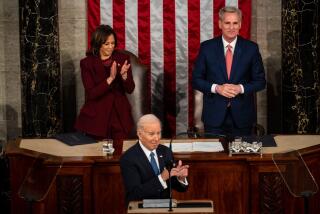Maintaining benefits more important to most Americans than cutting deficit, poll finds
Nearly twice as many Americans say it is more important to maintain the benefits from entitlement programs than it is to cut the budget deficit, according to a poll by the Pew Research Center for the People & the Press released Thursday, the day President Obama and top congressional leaders met to discuss budget and debt issues.
The poll found that about three of every five Americans said they wanted to maintain Social Security and Medicare benefits while 32% said it was more important to take steps to reduce the budget deficit. Politically, Democrats across all income levels support maintaining entitlement programs while the GOP is split, with the less affluent being more likely to support keeping the benefits than the rich.
The poll comes as Obama and Vice President Joe Biden, who has been the administration’s point man in budget negotiations, sat down with congressional leaders from both parties and both chambers. The attendees include House Speaker John Boehner (R-Ohio), House Majority Leader Eric Cantor (R-Va.), House Minority Leader Nancy Pelosi (D-San Francisco), House Minority Whip Steny Hoyer (D-Maryland), Senate Majority Leader Harry Reid (D-Nevada), Senate Majority Whip Dick Durbin (D-Ill.), Senate Minority Leader Mitch McConnell (R-Ky.) and Senate Minority Whip Jon Kyl (R-Ariz.).
The talks will focus on the upcoming deadline for raising the debt ceiling, but will include a range of other topics such as spending cuts and possible revenue increases sought by the Democrats. Republicans are also seeking changes in entitlement programs such as Medicare, the health program for the elderly; Medicaid, the health program for the poor; and Social Security.
Both sides have signaled that all issues are on the table though it is unclear how far either side is prepared to go to abandon their traditional constituencies. Republicans insist they oppose any tax increase, but some might be open to closing some tax loopholes that are being pushed by Democrats who oppose major changes in Medicare and Social Security but may be open to smaller steps.
According to the Pew poll, Americans strongly back the major entitlement programs. In addition to backing the programs over cutting budget deficits, most Americans also oppose making Medicare recipients more responsible for their healthcare costs and allowing states to limit Medicaid eligibility. About 61% said people on Medicare already pay enough of their own healthcare costs; 31% said they think recipients need to pay more healthcare costs to make the system financially secure.
On Medicaid, just 37% want to allow states to cut back on eligibility rules while a majority, 58%, said low-income people should continue to get Medicaid benefits.
The political distinctions were intriguing as the nation moves along in the 2012 presidential cycle in which the economy and budget-related issues are considered to be the top draw for voters. Fifty percent of Republicans said that maintaining benefits is more important than deficit reduction, while Democrats, by 72% to 21%, overwhelmingly said preserving benefits was more important than reducing the deficit. Independents split in favor of benefits by 53% to 38%.
But there was a split even among Republicans and Republican-leaning independents. About 63% of those with annual family incomes of $75,000 or more said it is more important to take steps to reduce the budget deficit, while 62% of Republicans with incomes of $30,000 or less said it was more important to maintain Social Security and Medicare benefits as they are.
Complicating the picture is the “tea party” movement and its ability to mobilize supporters within the GOP. Among Republicans and Republican leaners who agree with the tea party, movement, 57% said they view deficit reduction as more important than keeping Social Security and Medicare benefits as they are. Among Republicans and leaners who do not agree with the tea party, 36% said reducing the deficit is more important than maintaining benefits.
The poll is based on interviews with 1,502 adults, conducted June 15 to June 19. It has an overall margin of error of plus or minus 3.5 percentage points. But when broken down by political view, the margin of error increases to plus or minus six points for Republicans and plus or minus 5.5 points for Democrats and independents.
More to Read
Get the L.A. Times Politics newsletter
Deeply reported insights into legislation, politics and policy from Sacramento, Washington and beyond. In your inbox three times per week.
You may occasionally receive promotional content from the Los Angeles Times.











